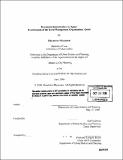| dc.contributor.advisor | Karl Seidman. | en_US |
| dc.contributor.author | Miyazawa, Masatomo | en_US |
| dc.contributor.other | Massachusetts Institute of Technology. Dept. of Urban Studies and Planning. | en_US |
| dc.coverage.spatial | a-ja--- | en_US |
| dc.date.accessioned | 2007-06-28T12:20:41Z | |
| dc.date.available | 2007-06-28T12:20:41Z | |
| dc.date.copyright | 2006 | en_US |
| dc.date.issued | 2006 | en_US |
| dc.identifier.uri | http://hdl.handle.net/1721.1/37668 | |
| dc.description | Thesis (M.C.P.)--Massachusetts Institute of Technology, Dept. of Urban Studies and Planning, 2006. | en_US |
| dc.description | Appendix, The TMO story, written in Japanese characters. | en_US |
| dc.description | Includes bibliographical references (p. 115-118). | en_US |
| dc.description.abstract | Downtowns have experienced decline since the 1990s in Japan and several strategies have been implemented to deal with it. This research focuses on one of such strategies-the Town Management Organization (TMO) model. Although the model was expected to achieve downtown revitalization through managing downtown areas, it has made negligible contributions. This research examines the reasons why the TMO model has not worked well through a survey and interviews with TMO staff members. This research demonstrates that TMOs tend to face obstacles at two different stages, which has led to the low level of contribution of the TMO model. At the planning stage, most TMO boards are dominated by commercial stakeholders and do not take in broad opinions. As a result, most TMOs do not gain benefits from active participation of various local stakeholders or receive their political and financial support. At the implementation stage, TMOs face different difficulties according to their funding structure. TMOs raising their funds mainly from such outside sources as subsidies tend to face funding shortages and lack of staff, and as a result, do not conduct effective revitalization activities. | en_US |
| dc.description.abstract | (cont.) In contrast, TMOs that are not dependent on outside sources but make most earnings from the sales of goods or services are likely to face deficits and focus on profitable activities which might not be related to downtown revitalization. This research recommends that TMOs reform their boards, capitalize on external conditions, diversify their funding sources, and utilize other resources such as volunteers and financial institutions. In addition, this research proposes that governments create effective public policies to help TMOs carry out these recommendations. | en_US |
| dc.description.statementofresponsibility | by Masatomo Miyazawa. | en_US |
| dc.format.extent | 124 p. | en_US |
| dc.language | eng | en_US |
| dc.language.iso | eng | en_US |
| dc.publisher | Massachusetts Institute of Technology | en_US |
| dc.rights | M.I.T. theses are protected by copyright. They may be viewed from this source for any purpose, but reproduction or distribution in any format is prohibited without written permission. See provided URL for inquiries about permission. | en_US |
| dc.rights.uri | http://dspace.mit.edu/handle/1721.1/7582 | |
| dc.subject | Urban Studies and Planning. | en_US |
| dc.title | Downtown revitalization in Japan : examination of the Town Management Organization model | en_US |
| dc.type | Thesis | en_US |
| dc.description.degree | M.C.P. | en_US |
| dc.contributor.department | Massachusetts Institute of Technology. Department of Urban Studies and Planning | |
| dc.identifier.oclc | 124065012 | en_US |
